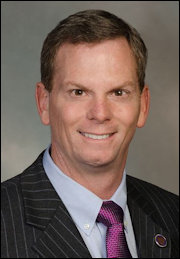
by Chris Braunlich
Should Virginia teachers have equal access to any legitimate employee association offering professional support, insurance and other benefits, so they can find the best deal for their money?
Legislation introduced by Sen. William DeSteph, R-Virginia Beach, SB1236, would give non-profit Virginia teacher associations an equal opportunity to make their pitch to teachers in every school division. It would end the practice in many school systems of providing monopoly access to politicized employee associations, notably the Virginia Education Association.
The issue is no trivial matter – not for the associations nor, especially, for the employees. In a litigious world, teachers – who regularly interact with underage minors, parents, colleagues, and powerful administrators – are especially in need of professional support and liability insurance providing legal protection. It is something they never want to use but know they need to have.
There are three teacher organizations providing broad-based member insurance in Virginia: The Virginia Education Association (VEA), the American Federation of Teachers (AFT), and Virginia Professional Educators (VPE).
The first two are unions; the third is not, and therein lies the difference. The AFT and VEA have local units; both engage heavily in political activity; both send a large portion of their dues money to the national union.
VPE, on the other hand, doesn’t add dues to support another layer of infrastructure at either the local or national level. Nor does it spend funds on political activity.
The result is that VPE’s dues are only $180 a year – about $300-$400 less than the two unions.
This allows VPE to make a financial case to prospective members: Saving $300 a year is like receiving a pay raise of nearly a half percent more, each and every year.
Just as important is the freedom from politics. Both the NEA and AFT are known as political extensions of the Democratic Party. As an example, of 289 candidates for Congress endorsed by the NEA last year, only 10, or 3.4 percent, were Republican. In Virginia, the odds are a little better: A whopping 12 percent of their endorsed candidates for General Assembly were Republican in 2017.
Yet, a Fall 2017 Education Week Research Center poll demonstrated that 27 percent of teachers considered themselves Republican, and that while half of teachers reported voting for Hillary Clinton, half did not:29 percent voted for Donald Trump, 13 percent voted for a third-party candidate and eight percent did not vote at all.
The mantra of “less cost, without the politics” is an attractive one to many and is one reason VPE is now the second largest teacher association in Virginia. This appears to unnerve the largest one.
Prospective employee associations are best able to approach prospective members if they are able to do things like set up tables at new employee orientations, or have access to teacher mailboxes at school or teacher email addresses.
In what can only be described as collusion to maintain a limited marketplace, many school superintendents, school boards and VEA leaders work in concert to block out competition.
In Virginia Beach, when equal access was just too much for the VEA to bear, it became (according to the VEA daily blog) “a local issue the Virginia Beach Education Association faced and fought off” … the school board change the rules to give access only to those who have a local organization – which would force the VPE to create the very bureaucracy they seek to avoid.
In another city with nearly 1,400 teachers, the HR Department gave permission for VPE to leave personalized material in each teacher’s mailbox only to be told after printing and distributing it to every school that “the new Superintendent doesn’t want to anger the VEA, so the permission is withdrawn.” These expensive materials were now wasted.
It is a frequent comment. In a state whose forebears declared their independence partly over a forced monopolistic trade with England, the most frequent refrain is, “The current teachers’ union would be upset if we let in someone else.” In other words: Don’t rock the boat, by ensuring a monopoly.
DeSteph’s bill, which passed the State Senate, requires local school divisions to provide equal access: If one teacher association is allowed to have a table at new employee orientations, all will. If one teacher association is given access to teacher mailboxes or teacher email address, all must. If one is denied, all must be denied. It would put all employee groups on an even playing field.
Which has sent the VEA into paroxysms of anguish. To them, DeSteph’s bill is unfair precisely because it would (a) put employee groups on a level playing field and (b) tell local school boards and superintendents they have to be fair in the way they treat their employee organizations.
Their arguments do not include what’s best for teachers … possibly because what is best for teachers would be having the right to save money by using a less expensive insurance plan. Nor should any teacher be forced to have their membership dues used to support candidates or political agendas which violate their own personal beliefs or political preferences. What’s best for teachers is not always in the best interests of the union.
“To govern is to choose,” said British politician Nigel Lawson. Legislators voting on this bill will be choosing: To side with teachers seeking a less expensive alternative? Or with union leaders granted a near-monopoly by many school systems at taxpayer expense? For equal access? Or for protectorates that block out competition?
Chris Braunlich is vice president of the Thomas Jefferson Institute. He previously served as president of the Virginia State Board of Education and as an eight-year member of the Fairfax County School Board. He may be reached at chris@thomasjeffersoninst.org. This column was published originally by the Thoms Jefferson Institute.

Leave a Reply
You must be logged in to post a comment.